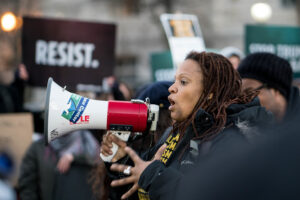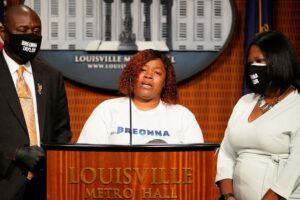
By Jaylen Williams
Calls to defund the police after the death of George Floyd got a lot of attention in the 2020 election season, with each presidential candidate accusing the other of seeking to slash the budget for law enforcement. But what does the call to “defund” even mean and does either outgoing President Trump or President-Elect Joe Biden support it?
The word “defund” has caused many conservative groups to paint a picture of a 911 service that does not answer calls and a dystopian America in which crime is rampant.
Biden, who won the divisive election, said he does not want to defund the police, despite the claims of Trump. Biden told ABC’s Robin Roberts, “I don’t want to defund police departments. I think they need more help, they need more assistance…there are unethical cops. They should be rooted out.”
Biden said that instead Trump wants to defund the police, telling Roberts, “He proposes cutting a half a billion dollars of local police support.” Biden later added, “The only guy that actually put in a bill to… defund the police is Donald Trump.”
Trump has spoken at length about the “radical left” wanting to strip money from law enforcement, saying at a Florida rally, “We will never, ever defund our police. OK? That I can tell you. We are not defunding police.”
Biden’s claim originates from the administration’s proposed budget cut of $465.8 million to the Office of Justice Programs, which provides grants to communities for public safety issues. Congress has not voted on the 2021 budget yet. Instead lawmakers passed a continuing resolution to keep the government funded through Dec. 11, which avoided a shutdown at the end of September.
On the flip side, in an interview with Fox News host Chris Wallace, Trump was unable to provide any evidence of his claim that it is actually Biden who wants to defund the police. Biden’s police reform plan calls for $300 million in funding for community-oriented policing, a portion of which would go toward hiring more police, according to his campaign website.
The Black Lives Matter organization said on its website that the “defund the police” proposal is not complicated. In a video, BLM Managing Director Kailee Scales said that it means shifting some portion of the billions of dollars from police department budgets around the country to increased funding for education, employment, health care, housing and other services in poor communities.
Some cities appear to be listening. Police in Minneapolis, where Floyd was killed, were allotted $193 million in the city’s annual budget. However, in June the city council approved moving $1.1 million from the police to the health department.
In Louisville, where Breonna Taylor was killed by police, the department received $190 million, which is up slightly from the $189.9 million allotted last year. The police force makes up the largest part of the city budget.
“In some cities, just defunding the police by 5% would double the budget for public health,” Scales said. She contends that the policing system in America does not work so no additional money should be invested.
Student activist Hannah Bessette, a junior political science major at Howard University, said, “Defunding the police means abolishing the policing system. The system itself was built on a racial hierarchy and the ability to control a minority. Defunding the police doesn’t mean living without safety or security. It’s about funding necessary resources and creating an equitable environment to negate the factors that contribute to crime the most: socio-economic status and proximity.”
Before the election, Trump rejects that idea stating, “We won’t be dismantling our police. We won’t be disbanding our police. We won’t be ending our police force in a city.”
At a White House event in June, he said, “I guess you might have some cities that want to try, but it’s going to be a very, very sad situation if they did, because people aren’t going to be protected.”
The House, led by California Democrat Karen Bass, and the Senate, led by South Carolina Republican Tim Scott, proposed legislation after Floyd’s death. The bills overlapped in that they both increase the use of body cameras, incentivize state and local police departments to not use chokeholds, and make lynching a federal crime. But there is no chokehold ban or end to qualified immunity for police officers in the Republican bill. Both bills appear to have stalled.
Bessette said, “Abolition is the only way to create change not tampered with by a brutal and violent history. Our system is built to create a race and class hierarchy, that’s not a system that can be ‘reworked.’”
Bessette said the funding now used for police should instead go to education, social security programs, health care, affordable housing, the opioid epidemic, restorative justice programs and mental health programs.
Many young voters did not feel connected to either candidate on a plethora of issues. “With this government system, there isn’t much that I feel that I can ‘expect,’” Bessette said. “But in the short term, I expect accountability and justice for the innumerable instances of state-sanctioned brutality on BIPOC, and accountability for the suppression of the country’s right to organize against the government without being met by suppression and violence.”


